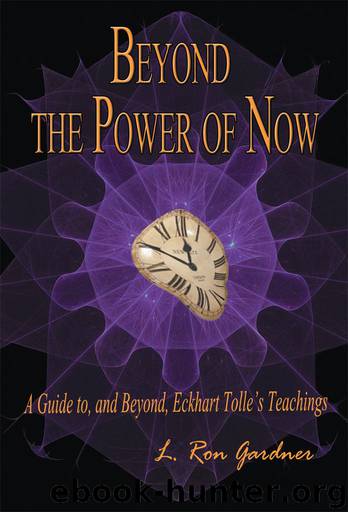Beyond the Power of Now: A Guide to, and Beyond, Eckhart Tolle's Teachings by L. Ron Gardner

Author:L. Ron Gardner [Gardner, L. Ron]
Language: eng
Format: azw3
Publisher: Vernal Point Publishing
Published: 2013-12-09T05:00:00+00:00
Transformation through, versus Denial of, the Body
Why have most religions condemned or denied the body, regarding it as sinful and as a hindrance to spiritual life?
First, as Tolle points out, humans did not want to admit they were animals with the same primitive biological drives as other creatures. So they invented myths, like the Garden of Eden, to explain their fall from Grace. Instead of perceiving themselves as risen apes, they could now imagine themselves as fallen angels, corrupted by “sinful” carnal cravings. And because these carnal cravings stemmed from the flesh, by regarding the body as the evil, devil-infused cause of their fall from Grace, they became estranged from their physical vehicles and at war with their own biology.
Second, as Tolle does not point out, even if you befriend your body and embrace your animal nature, the physical vehicle still remains problematic spiritually. For unless you can master your “vital”—your animal within—your spiritual life will be impeded by the constant demands of your undisciplined flesh. And disciplining, or controlling, your fleshly cravings, your food and sex urges, is not a lot of fun. The truth is that unless you eat small, simple, easily digestible meals, your mind will “feed on the food” and disturb your meditation. And unless you completely cease, or at least drastically limit, your orgasms, you will lack the subtle life-force essential for communing with the Divine and conducting its Spirit-current.
To emphasize that denial of the body is not the way to find God, salvation, or enlightenment, Tolle cites the Buddha’s experience: “Even the Buddha is said to have practiced body denial through fasting and extreme forms of asceticism for six years, but he did not attain enlightenment until after he had given up this practice.” What Tolle conveniently fails to mention is the fact that after the Buddha renounced extreme asceticism, he still lived as a hermit, practiced celibacy, ate only one meal per day, and meditated virtually nonstop. The Buddha termed his post-extreme ascetic life the “Middle Path,” but by modern standards the only way to describe it would be extreme.
Tolle is guilty of a disputable statement when he says, “Of the ancient teachings concerning the body, only fragments survive.” Anyone who has studied Indian Hatha yoga, Taoist yoga, or Tibetan tantra knows that this is not the case. These holistic systems clearly embody and represent far more than mere fragments. Tolle is also barking up the wrong tree when he blames the belief that “you are not your body” as the reason so many seekers never achieved enlightenment. According to Tolle, because of non-identification with the body, “countless seekers have thus been prevented from attaining spiritual realization for themselves and becoming finders.” The fact is, two of the greatest Indian sages, the Buddha and Ramana Maharshi, as well as untold other Buddhist and Hindu yogis, successfully emphasized non-identification with the physical vehicle as a means to achieving enlightenment. When Tolle says that you aren’t your mind, but you are your body, he in
Download
This site does not store any files on its server. We only index and link to content provided by other sites. Please contact the content providers to delete copyright contents if any and email us, we'll remove relevant links or contents immediately.
Tools of Titans by Timothy Ferriss(7850)
Crystal Healing for Women by Mariah K. Lyons(7734)
The Witchcraft of Salem Village by Shirley Jackson(7060)
Inner Engineering: A Yogi's Guide to Joy by Sadhguru(6466)
The Four Agreements by Don Miguel Ruiz(6343)
The Power of Now: A Guide to Spiritual Enlightenment by Eckhart Tolle(5380)
Secrets of Antigravity Propulsion: Tesla, UFOs, and Classified Aerospace Technology by Ph.D. Paul A. Laviolette(5071)
The Wisdom of Sundays by Oprah Winfrey(4967)
Room 212 by Kate Stewart(4768)
Pale Blue Dot by Carl Sagan(4653)
Fear by Osho(4515)
The David Icke Guide to the Global Conspiracy (and how to end it) by David Icke(4416)
Rising Strong by Brene Brown(4211)
Animal Frequency by Melissa Alvarez(4182)
How to Change Your Mind by Michael Pollan(4132)
Sigil Witchery by Laura Tempest Zakroff(4054)
Real Magic by Dean Radin PhD(3947)
Man and His Symbols by Carl Gustav Jung(3872)
The Art of Happiness by The Dalai Lama(3867)
